Twist ransomware (Virus Removal Instructions) - Quick Decryption Solution
Twist virus Removal Guide
What is Twist ransomware?
Twist ransomware – malicious program that locks files on the targeted computer
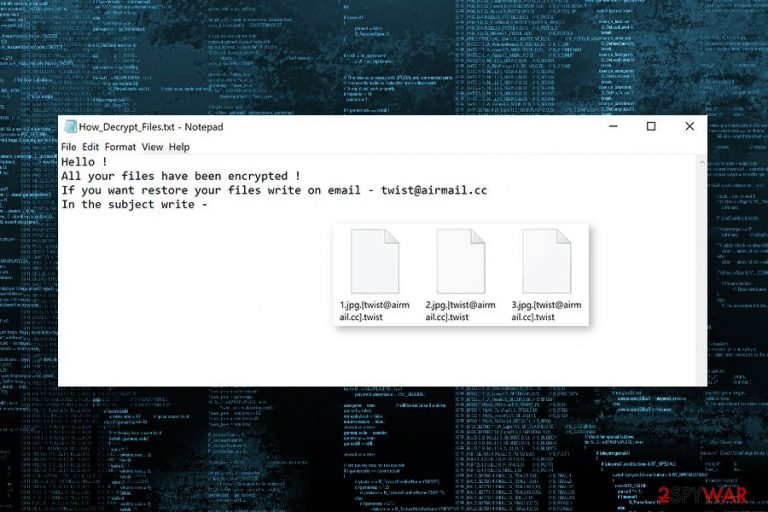
Twist virus is a file-encrypting malware that appends .[twist@airmail.cc].twist file extension to important data saved on victim’s computer. Authors of malware also leave a ransom note in How_Decrypt_Files.txt which is downloaded on the desktop.
Researchers say that Twist ransomware shares some similarities to Blind ransomware virus. However, any relations aren’t confirmed yet. Ransomware uses a strong and unbreakable encryption algorithm. Additionally, it seems to be capable of deleting Shadow Volume Copies. Hence, affected files cannot be decrypted yet.
When Twist malware gets into the system, it does not rush with data encryption. First of all, it strengthens its presence by modifying or creating new Windows registry entries, injecting malicious code into various system processes, and install executables that perform malicious tasks on the system.
As soon as Twist virus makes files inaccessible by adding .twist extension, it also delivers a short ransom note in TXT file. The message only tells victims to send an email:
Hello !
All your files have been encrypted !
If you want restore your files write on email – twist@airmail.cc
In the subject write -id-[redacted]
The security team from dieviren.de[1] warns that contacting cyber criminals is not a good idea. The idea of ransomware viruses is to swindle the money from computer users. Hence, crooks will ask you to transfer a couple of hundreds of dollars in digital currency, usually Bitcoins.
However, once they receive the money, they might disappear or ask you for more threatening to delete or leak your documents or pictures online. Crooks’ abilities are unknown. Hence, you should not get into contact and just remove Twist ransomware virus from the computer.
Twist virus removal requires obtaining reputable malware removal tool, such as FortectIntego or SpyHunter 5Combo Cleaner. However, eliminating the virus won’t help to bring back corrupted files. Security tools are not capable of decrypting files.
Data recovery is possible from backups only because the official Twist decryptor is not available yet. However, if you haven’t created additional copies of your files, you can try alternative tools and methods presented at the end of the article.
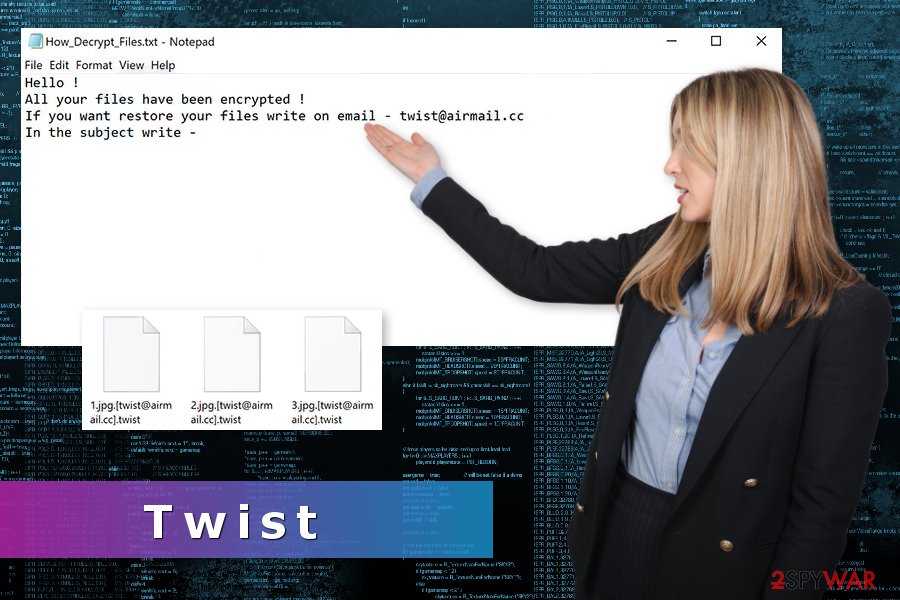
Possible ways to get infected with ransomware and how to avoid it
Security experts remind that cyber criminals might spread their malicious program using different techniques. However, most of the time it requires user’s participation. Hence, all responsibility for ransomware attack belongs to you.
Malware might enter the system when you:
- open infected email attachment;
- download obfuscated file, program or update;
- do not update operating system and programs;
- browse through insecure websites;
- click on a malicious ad.[2]
It’s highly recommended to be careful when browsing the web. You should always double-check the information before opening unknown email attachment even if it looks like a safe document. [3]Additionally, you have to avoid visiting questionable websites and using untrusted freeware download sites.
Finally, download software or its updates only from reliable developers, keep your software and device updated, and install an antivirus that offers real-time protection.
Get rid of Twist ransomware virus
To remove Twist virus from the device, you have to perform a full system scan with an updated and professional malware removal software. If you are not sure which tool to choose, we recommend using FortectIntego, SpyHunter 5Combo Cleaner or Malwarebytes.
However, smooth and easy Twist removal requires booting the PC to Safe Mode with Networking which disables the virus. In this way, malware cannot prevent you from installing security software or scanning the system. You can find the guide below.
Getting rid of Twist virus. Follow these steps
Manual removal using Safe Mode
To remove Twist malware automatically without any problems, you should reboot the system to Safe Mode with Networking:
Important! →
Manual removal guide might be too complicated for regular computer users. It requires advanced IT knowledge to be performed correctly (if vital system files are removed or damaged, it might result in full Windows compromise), and it also might take hours to complete. Therefore, we highly advise using the automatic method provided above instead.
Step 1. Access Safe Mode with Networking
Manual malware removal should be best performed in the Safe Mode environment.
Windows 7 / Vista / XP
- Click Start > Shutdown > Restart > OK.
- When your computer becomes active, start pressing F8 button (if that does not work, try F2, F12, Del, etc. – it all depends on your motherboard model) multiple times until you see the Advanced Boot Options window.
- Select Safe Mode with Networking from the list.
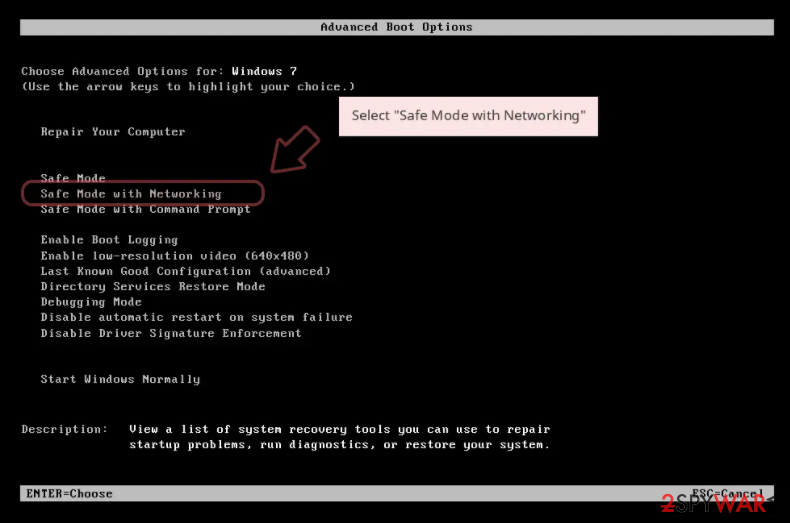
Windows 10 / Windows 8
- Right-click on Start button and select Settings.
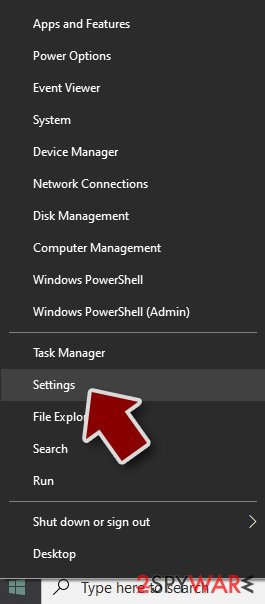
- Scroll down to pick Update & Security.
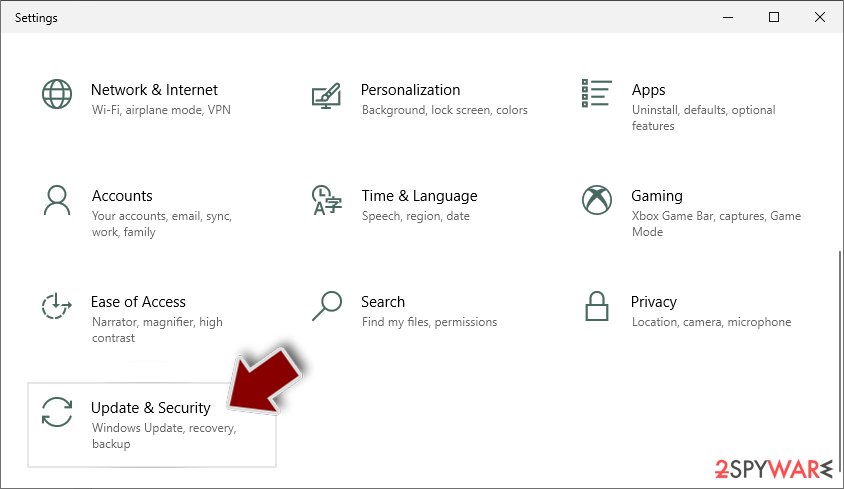
- On the left side of the window, pick Recovery.
- Now scroll down to find Advanced Startup section.
- Click Restart now.
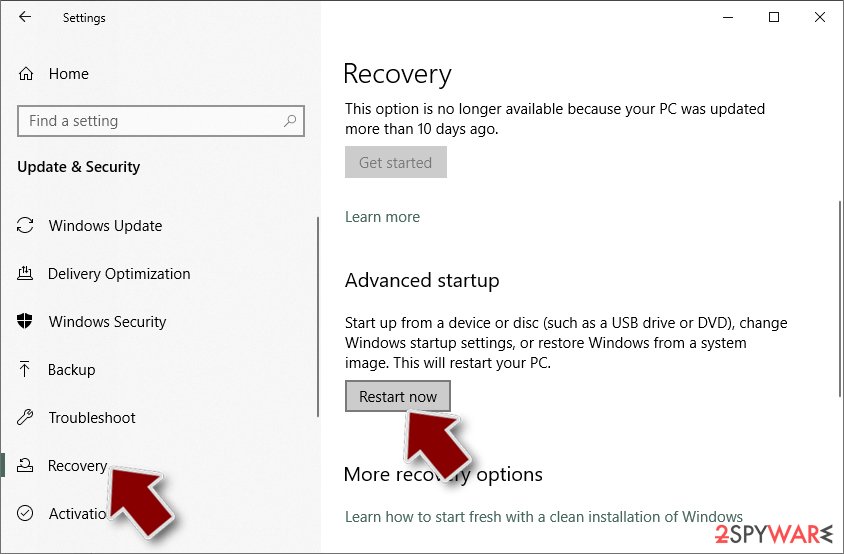
- Select Troubleshoot.
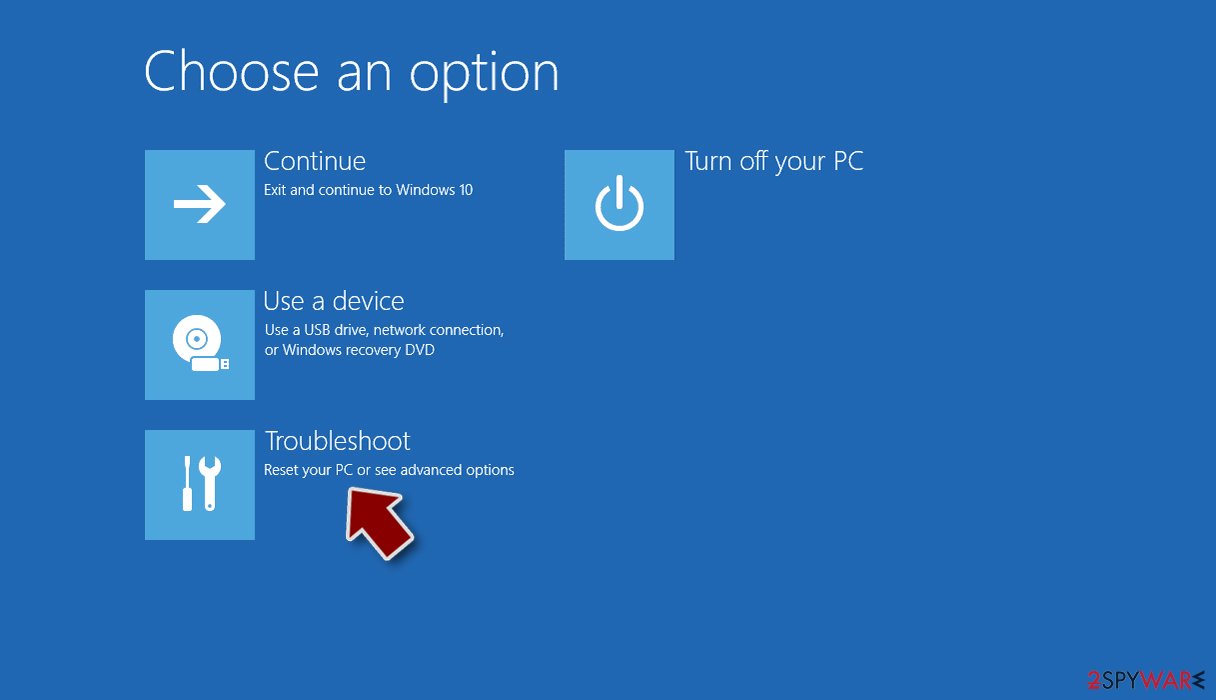
- Go to Advanced options.
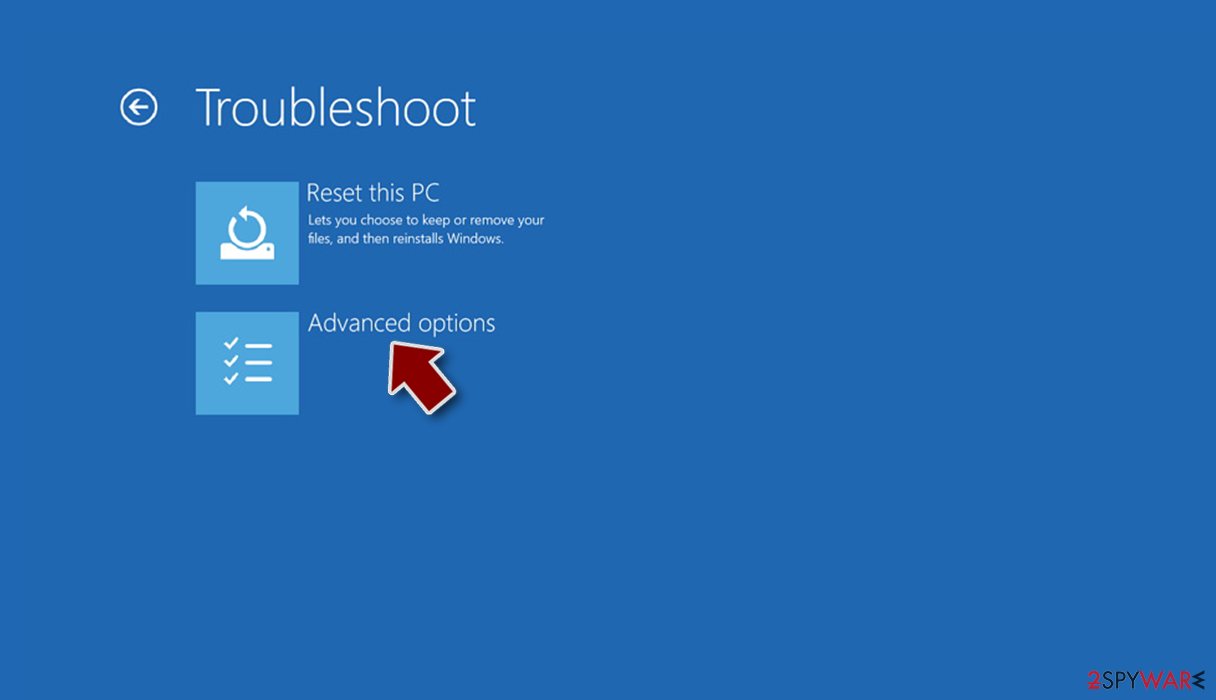
- Select Startup Settings.
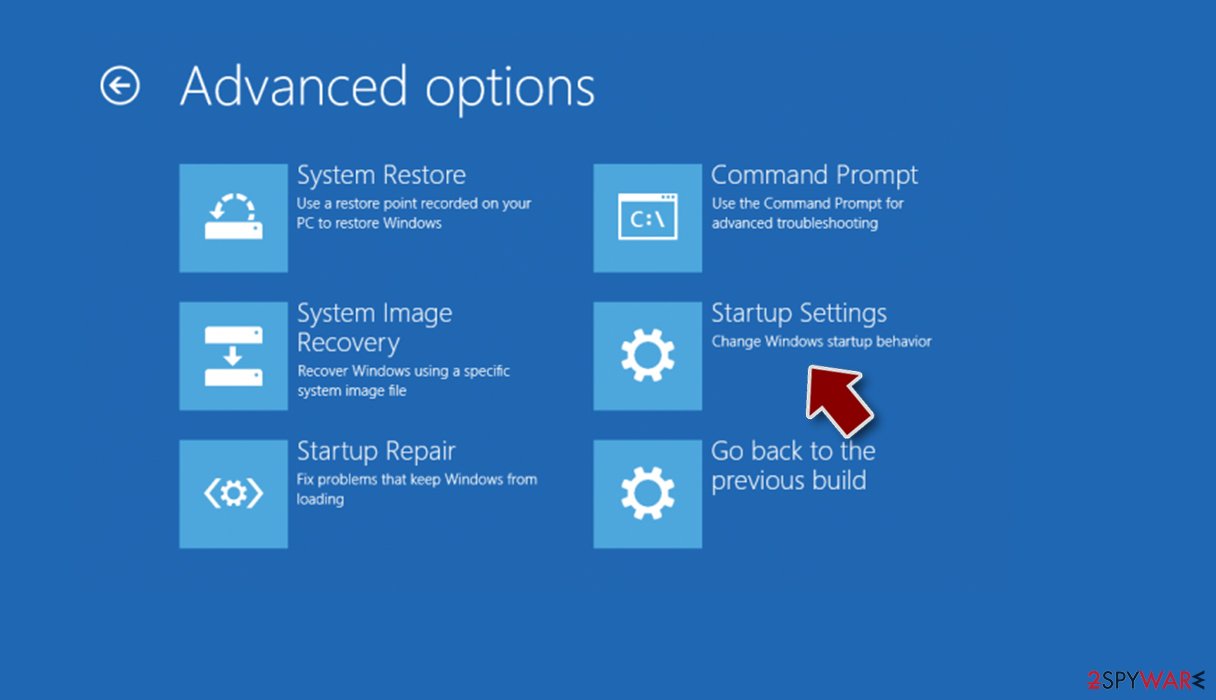
- Press Restart.
- Now press 5 or click 5) Enable Safe Mode with Networking.
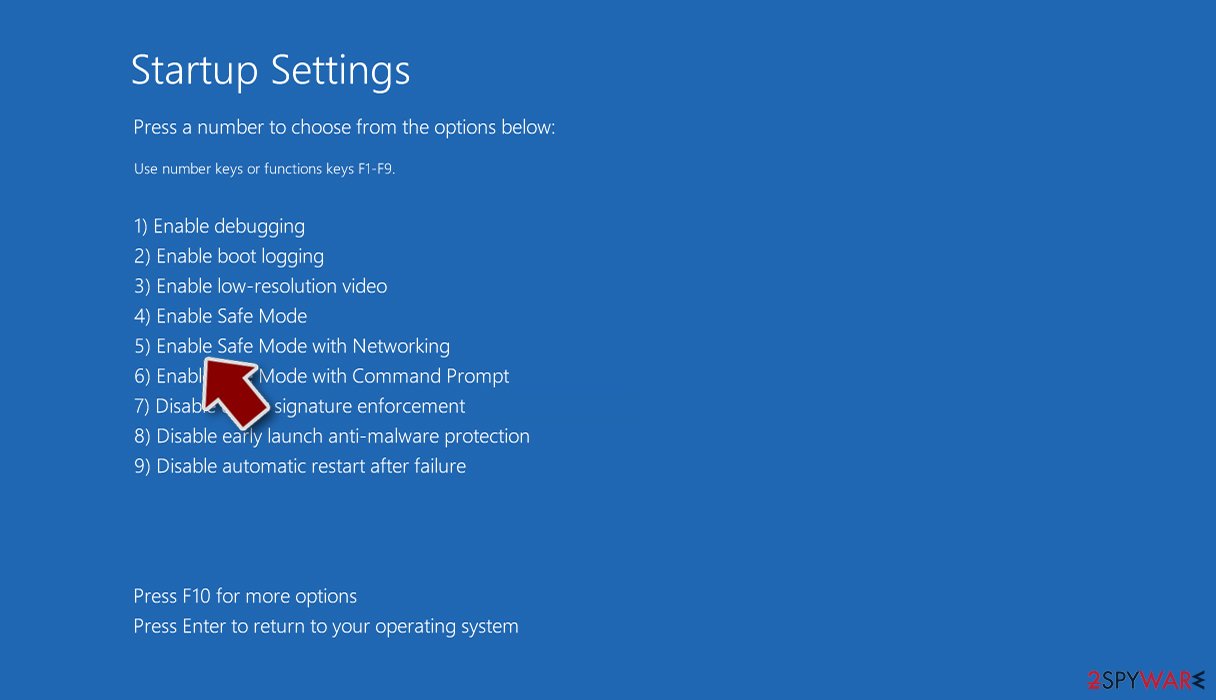
Step 2. Shut down suspicious processes
Windows Task Manager is a useful tool that shows all the processes running in the background. If malware is running a process, you need to shut it down:
- Press Ctrl + Shift + Esc on your keyboard to open Windows Task Manager.
- Click on More details.
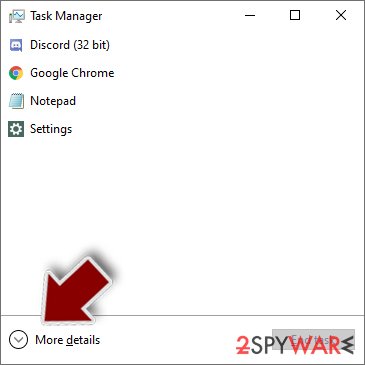
- Scroll down to Background processes section, and look for anything suspicious.
- Right-click and select Open file location.
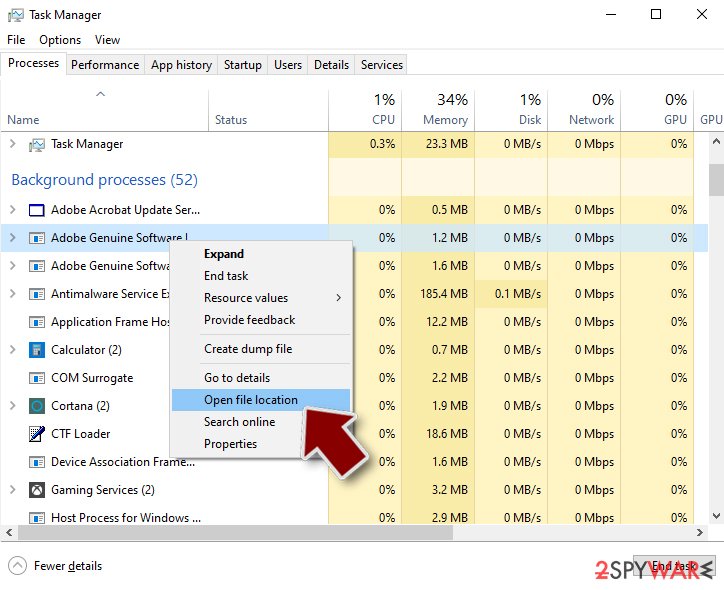
- Go back to the process, right-click and pick End Task.
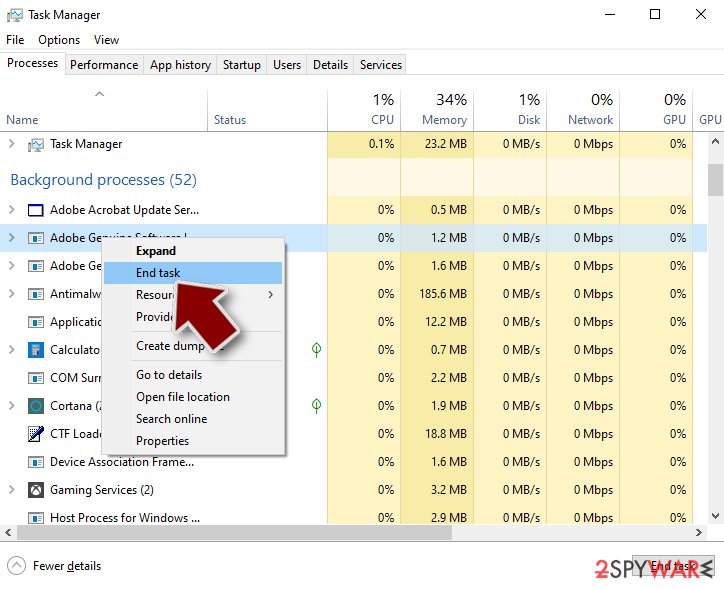
- Delete the contents of the malicious folder.
Step 3. Check program Startup
- Press Ctrl + Shift + Esc on your keyboard to open Windows Task Manager.
- Go to Startup tab.
- Right-click on the suspicious program and pick Disable.
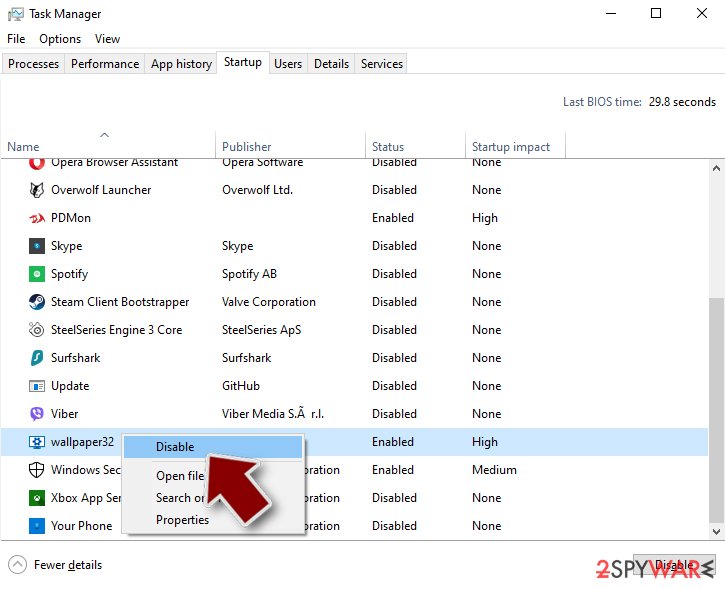
Step 4. Delete virus files
Malware-related files can be found in various places within your computer. Here are instructions that could help you find them:
- Type in Disk Cleanup in Windows search and press Enter.
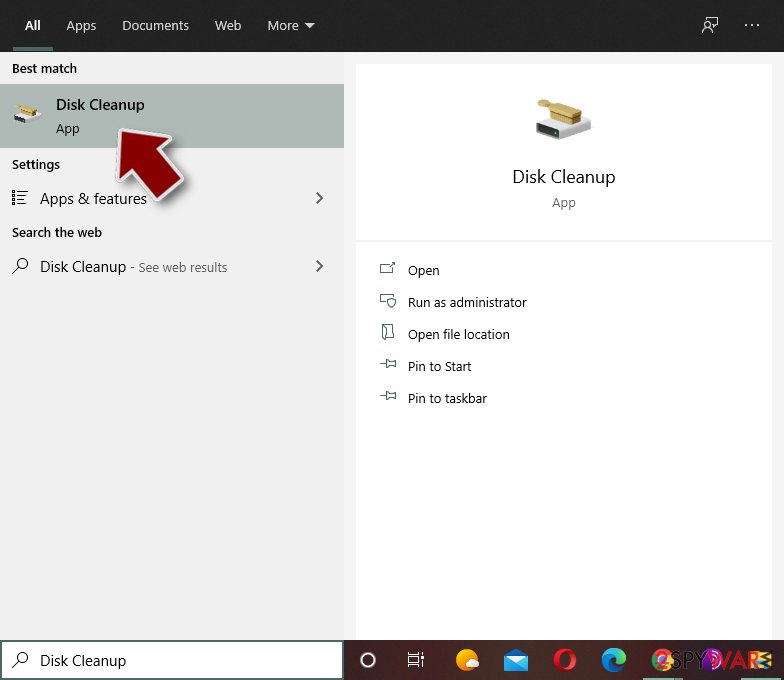
- Select the drive you want to clean (C: is your main drive by default and is likely to be the one that has malicious files in).
- Scroll through the Files to delete list and select the following:
Temporary Internet Files
Downloads
Recycle Bin
Temporary files - Pick Clean up system files.
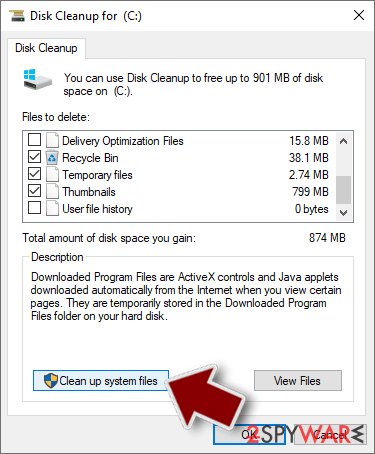
- You can also look for other malicious files hidden in the following folders (type these entries in Windows Search and press Enter):
%AppData%
%LocalAppData%
%ProgramData%
%WinDir%
After you are finished, reboot the PC in normal mode.
Remove Twist using System Restore
-
Step 1: Reboot your computer to Safe Mode with Command Prompt
Windows 7 / Vista / XP- Click Start → Shutdown → Restart → OK.
- When your computer becomes active, start pressing F8 multiple times until you see the Advanced Boot Options window.
-
Select Command Prompt from the list

Windows 10 / Windows 8- Press the Power button at the Windows login screen. Now press and hold Shift, which is on your keyboard, and click Restart..
- Now select Troubleshoot → Advanced options → Startup Settings and finally press Restart.
-
Once your computer becomes active, select Enable Safe Mode with Command Prompt in Startup Settings window.

-
Step 2: Restore your system files and settings
-
Once the Command Prompt window shows up, enter cd restore and click Enter.

-
Now type rstrui.exe and press Enter again..

-
When a new window shows up, click Next and select your restore point that is prior the infiltration of Twist. After doing that, click Next.


-
Now click Yes to start system restore.

-
Once the Command Prompt window shows up, enter cd restore and click Enter.
Bonus: Recover your data
Guide which is presented above is supposed to help you remove Twist from your computer. To recover your encrypted files, we recommend using a detailed guide prepared by 2-spyware.com security experts.If your files are encrypted by Twist, you can use several methods to restore them:
Try Data Recovery Pro
This tool might help to recover files affected by Twist virus:
- Download Data Recovery Pro;
- Follow the steps of Data Recovery Setup and install the program on your computer;
- Launch it and scan your computer for files encrypted by Twist ransomware;
- Restore them.
Take advantage of Windows Previous Versions feature
If System Restore was enabled before ransomware attack, you should be able to access previously saved versions of corrupted files by following these steps:
- Find an encrypted file you need to restore and right-click on it;
- Select “Properties” and go to “Previous versions” tab;
- Here, check each of available copies of the file in “Folder versions”. You should select the version you want to recover and click “Restore”.
Use ShadowExplorer if malware failed to delete shadow copies
Ransomware seems to delete Shadow Volume Copies. However, if it fails, you should try this tool:
- Download Shadow Explorer (http://shadowexplorer.com/);
- Follow a Shadow Explorer Setup Wizard and install this application on your computer;
- Launch the program and go through the drop down menu on the top left corner to select the disk of your encrypted data. Check what folders are there;
- Right-click on the folder you want to restore and select “Export”. You can also select where you want it to be stored.
Twist decryptor is not available yet.
Finally, you should always think about the protection of crypto-ransomwares. In order to protect your computer from Twist and other ransomwares, use a reputable anti-spyware, such as FortectIntego, SpyHunter 5Combo Cleaner or Malwarebytes
How to prevent from getting ransomware
Do not let government spy on you
The government has many issues in regards to tracking users' data and spying on citizens, so you should take this into consideration and learn more about shady information gathering practices. Avoid any unwanted government tracking or spying by going totally anonymous on the internet.
You can choose a different location when you go online and access any material you want without particular content restrictions. You can easily enjoy internet connection without any risks of being hacked by using Private Internet Access VPN.
Control the information that can be accessed by government any other unwanted party and surf online without being spied on. Even if you are not involved in illegal activities or trust your selection of services, platforms, be suspicious for your own security and take precautionary measures by using the VPN service.
Backup files for the later use, in case of the malware attack
Computer users can suffer from data losses due to cyber infections or their own faulty doings. Ransomware can encrypt and hold files hostage, while unforeseen power cuts might cause a loss of important documents. If you have proper up-to-date backups, you can easily recover after such an incident and get back to work. It is also equally important to update backups on a regular basis so that the newest information remains intact – you can set this process to be performed automatically.
When you have the previous version of every important document or project you can avoid frustration and breakdowns. It comes in handy when malware strikes out of nowhere. Use Data Recovery Pro for the data restoration process.
- ^ Dieviren. Dieviren. Cyber security news.
- ^ Graham Cluley. Crypto-ransomware Spreads via Poisoned Ads on Major Websites. Tripwire. Security news, trends and insights.
- ^ Nilly Assia. Phishing and Ransomware – your inbox’s worst nightmare. ItProPortal. Business IT news, reviews, features and guides from around the world.







